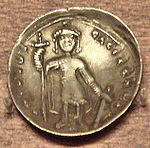Michael VII


Michael VII. Dukas or Parapinakes ( Middle Greek Μιχαὴλ Ζ 'Δούκας Παραπινάκης , * approx. 1050 ; † approx. 1090 ) was Eastern Roman emperor from 1067 to 1078 , but did not actually rule until 1071. He was with Maria of Alania , the king's sister Giorgi II of Georgia married.
Life
Michael was the eldest son of Constantine X. Dukas and Eudokia Makrembolitissa . Shortly after his birth he was made co-emperor (symbasileus) . After his father's death on May 21, 1067, he nominally succeeded his father to the throne, but was initially under the tutelage of his mother, who exercised de facto rule , together with his youngest brother Constantius . At the beginning of 1068 Eudokia married the successful military man Romanos Diogenes , who was promoted to co-emperor and de facto regent. At the same time, Michael's brother Andronikos was also accepted into the rulers' college, which was subsequently expanded to include the two young sons of Eudokias by Romanos, Leon and Nikephoros . On October 24, 1071 Michael was made sole ruler by his uncle, the Caesar Johannes Dukas . He raised his son Konstantin Dukas Porphyrogennetos , born in 1074, to co-emperor.
Michael was very educated and interested in music and geometrical problems as well as philosophy, probably under the influence of his teacher Michael Psellos , one of the most important scholars of his time. The chronicler Johannes Skylitzes (856, D) has nothing but contempt for such interests: "He (the emperor) wasted his energy in the construction of bad iambic and Anapaestic verses and thus ruined his empire ..."
Michael's weakness and the greed of his minister Nikephoritzes were devastating for the empire, which was then threatened and attacked from all sides. In 1071, before the start of his self-government in the west of Bari , the last possession on the Italian peninsula was lost to the Normans . In the east, the defeat in the Battle of Manzikert sealed the partial loss of Asia Minor to the Turkish Seljuks , which was promoted by the anarchy in the army . A wide strip of Asia Minor could not be defended against the Seljuks in 1074.
These misfortunes were partially offset by the suppression of a Bulgarian revolt under Konstantin Bodin and Georgi Vojtech (1072-1073), which, however, generated widespread dissatisfaction. In addition, there were raids by the Pechenegs under the rebel Nestor and the Hungarians on the northern border. In 1078 two generals rose simultaneously, Nikephoros Bryennios and Nikephoros Botaneiates ; the latter was proclaimed anti-emperor on January 7th and invaded Constantinople three months later. Michael abdicated in favor of his brother Konstantios, who could not assert himself against Botaneiates, and retired to the studio monastery . He later became Metropolitan of Ephesus .
His nickname Parapinakes ("minus a quarter") referred to the fact that he caused only three quarters of the amount of wheat to be sold at the same price in order to do justice to the prevailing monetary devaluation and thus save the household. Inflation, which at 25 percent was as high as the rise in wheat prices at the time, therefore coincided with this.
literature
- Charles M. Brand - Anthony Cutler : Michael VII Doukas . In: Oxford Dictionary of Byzantium Vol. 2, New York - Oxford 1991, pp. 1366-1367
- Anthulles A. Demosthenus: Michaēl VII Dukas (1071-1078), o anikanos autokratoras? Thessalonike 2005, ISBN 960-8353-49-1 . (Greek)
- Erwin window: Michael VII. Dukas Parapinakes . In: Biographical Lexicon on the History of Southeast Europe . Volume 3. Munich 1979, p. 178
Web links
Individual evidence
- ↑ britannica.com on Michael VII.
- ↑ a b c www.agiasofia.com on Michael VII.
- ↑ ( Page no longer available , search in web archives: moneymuseum.com about Michael VII. And the currency in his empire )
| predecessor | Office | successor |
|---|---|---|
| Romanos IV. |
Emperor of Byzantium 1071-1078 |
Nikephorus III. |
| personal data | |
|---|---|
| SURNAME | Michael VII |
| ALTERNATIVE NAMES | Michael VII Dukas; Michael Parapinakes |
| BRIEF DESCRIPTION | Sole ruler over the Eastern Roman Empire |
| DATE OF BIRTH | around 1050 |
| DATE OF DEATH | around 1090 |
| Place of death | Constantinople |